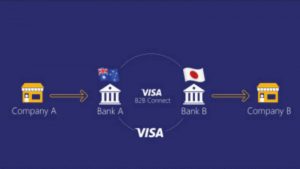
Its objectives, and approach, are similar to those of Mastercard and AmEx. Both have produced their own ‘visions’ for the future for a B2B operating environment where they act as payment clearing houses for business customers.
Chris Wiedenmann, VP, commercial payments and products at Commerce Bank said, “In a world of increasing global interconnectedness, the ability to make and receive payments quickly and transparently is critical for companies of all sizes. Commerce Bank is dedicated to delivering new and innovative solutions for our customers and, through our powerful relationship with Visa, we are excited to be participating in the Visa B2B Connect pilot.”

Visa initial partners
Visa’s initial partners, at least those announced, include:
- Commerce Bank in the United States
- Shinhan Bank in South Korea
- Union Bank of Philippines
- United Overseas Bank in Singapore.
With these, but no European initial partner which is curious, Visa is beginning to process bank to-bank test transactions. It says other partners will follow soon as is gears up for the 2018 commercial launch of B2B Connect.
Visa priorities
As a leading provider of commercial card payment solutions, Visa (like Mastercard and AmEx) sees opportunities in high-value cross-border payments. All three see this as an area ripe for improvement and innovation.
Today, making cross-border corporate payments often involves cumbersome, lengthy and friction-filled processes – for financial institutions and their corporate clients. Using technology based on a blockchain architecture, Visa B2B Connect simplifies this process by sending transactions over Visa’s network from the bank of origin directly to the recipient bank.
In this context, B2B Connect has the following guiding principles:
- security, interoperability and governance
- creativity, agility and product flexibility (but not at the expense of security, interoperability and governance)
- enabling itself to ‘think like a developer’
- open APIs, to allow developers to take our capabilities and to build solutions that can scale across multiple markets.
Visa Developer Platform
Visa has designed its new transaction platform for the exchange of high-value international payments between participating banks on behalf of their corporate clients. Managed by Visa end-to-end, B2B Connect aims to facilitate a consistent process to manage settlement in accordance with Visa standard practices.
A key part of B2B Connect is, therefore, its ‘API-first’ strategy. With B2B Connect APIs exposed in the Visa Developer Platform, Visa will provide B2B Connect to harness a global developer community in order to enable smarter cross-border B2B payments flows.
B2B Connect has three prime components:
- cryptographically secured B2B transactions
- transaction transparency and predictability
- trusted network where all parties are known participants on a permissioned blockchain operated by Visa.
While B2B Connect is currently for use only by participating pilot banks, any developer can use the B2B Connect APIs in the Visa sandbox, after registration and acceptance of the terms and conditions. But, only participating pilot banks and their technology partners will be able to use these APIs in production. (Bank participation in the pilot is subject to Visa approval and execution of a ‘pilot participation agreement’.)
What does it mean
Mastercard, AmEx and Visa are all seeking new B2B business from blockchain-based cross border payments. With this comes choice – for enterprises.
There will be a quite different choices for existing cross-border ‘agents’ – for example SWIFT, and even some central banks: competition seems inevitable.
But it is the banks which will have the hardest of choices. Do they go for one ‘ally’, which is simpler and cheaper? Or do they go for two or more?
Inevitably each of the Mastercard, AmEx and Visa (and other) solutions will be different. Yet all share one dimension: all are global in reach already. This may mean the banking community splits into cross-border payments groupings and drives unanticipated sets of downstream changes.

























